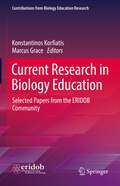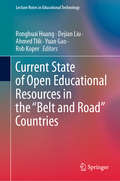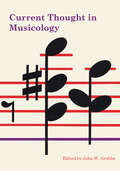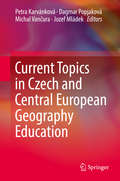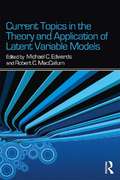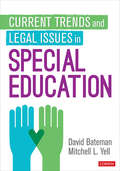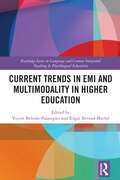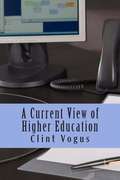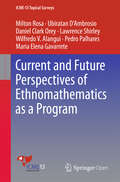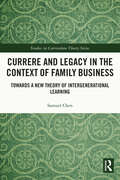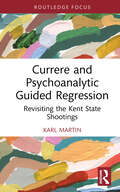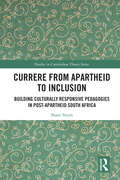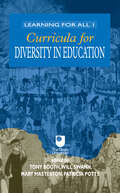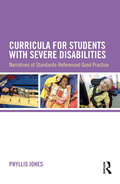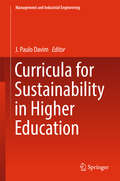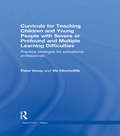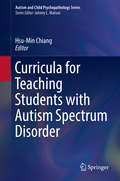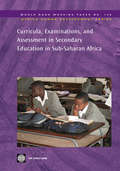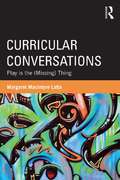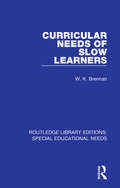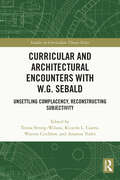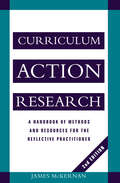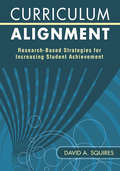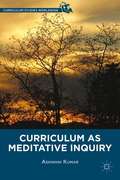- Table View
- List View
Current Research in Biology Education: Selected Papers from the ERIDOB Community (Contributions from Biology Education Research)
by Marcus Grace Konstantinos KorfiatisThis book is a collection of full papers based on the peer-reviewed submissions accepted for the ERIDOB 2020 conference (which was cancelled due to COVID-19). ERIDOB brings together researchers in Biology Education from around the world to share and discuss their research work and results. It is the only major international conference on biology education research, and all the papers therefore are written by international researchers from across Europe (and beyond), which present the findings from a range of contemporary biology education research projects. They are all entirely new papers describing new research in the field. The papers are peer-reviewed by experienced international researchers selected by the ERIDOB Academic Committee. The papers reflect the ERIDOB conference strands by covering topics on: Socioscientific issues, Nature of Science and scientific thinkingTeaching and learning in biologyPerceptions of biology and biology educationTextbook analysisOutdoor and environmental education By providing a collection of new research findings from many countries, this book is a great resource for researchers and practitioners such as school, college and university biology teachers' around the world. It is useful for training biology teachers and therefore valuable to teacher training institutions.
Current State of Open Educational Resources in the “Belt and Road” Countries (Lecture Notes in Educational Technology)
by Yuan Gao Rob Koper Ronghuai Huang Dejian Liu Ahmed TliliThis book presents the current state of Open Educational Resources (OER) within the countries covered by the China's Belt and Road Initiative. The authors describe eight aspects of OER development in their countries: infrastructure, policy, resources, open license, curriculum and teaching methodology, outcome, stakeholders and impact. This book also conducts a comparative study between those countries to identify the OER gaps in the Belt and Road countries. It then offers valuable insights and recommendations for several stakeholders, including policy makers and educators, wishing to integrate open educational resources into educational processes, as well as for those involved in inter-regional open educational resources cooperation.
Current Thought in Musicology
by John W. GrubbsNine lectures from the 1971 symposium at the University of Texas at Austin, on music history, theory and composition, education, and performance. Ranging from the Middle Ages to the present and touching on all the major disciplines of musicology, the nine papers collected in this volume constitute a broad overview of the direction of music scholarship in the 1970s. In &“Tractatus Esthetico-Semioticus: Model of the Systems of Human Communication,&” Charles Seeger presents a model of the situations in which the study of humanistic art may best be conducted. Charles Hamm writes in &“The Ecstatic and the Didactic: A Pattern in American Music&” of the pattern of conflicting points of view in music history and theory. American composer Elliott Carter, in his chapter titled &“Music and the Time Screen,&” presents a lucid explanation of his compositional process, including his concept of musical time. In &“Instruments and Voices in the Fifteenth-Century Chanson,&” Howard Mayer Brown suggests the nature of fifteenth-century performance, drawn from iconography and various musical sources. &“Nottebohm Revisited,&” by Lewis Lockwood, reexamines Beethoven&’s sketchbooks, showing the extent to which performing editions of his work must be updated. Daniel Heartz&’s article, &“The Chanson in the Humanist Era,&” is multidisciplinary and will interest a variety of scholars, including French historians and French literary historians. Gilbert Chase applies structuralism to musicological studies in his chapter, &“Musicology, History, and Anthropology: Current Thoughts.&” The concluding essays, &“The Prospects for Research in Medieval Music in the 1970s,&” by Gilbert Reaney, and &“The Library of the Mind: Observations on the Relationship between Musical Scholarship and Bibliography,&” by Vincent Duckles, provide a unique view of the opportunities for further work in these areas. Also included is an introduction by the editor, notes on the contributors, and an index.
Current Topics in Czech and Central European Geography Education
by Petra Karvánková Dagmar Popjaková Michal Vančura Jozef MládekThis book discusses current challenges related to teaching geography, mainly at the secondary school and higher education level. Focusing on a range of current topics, different methods, techniques, materials, applications, and approaches to geography education with a regional Central European perspective, the book makes an original contribution to the field. Most of the chapters aims at the practical development of the themes such as geography curriculum (Part I), global education, inquiry-based education, project-based learning, case studies, powerful teaching (Part II), using of information and communication technologies (Part III) in geography teaching. The final part (Part IV) covers some geopolitical, and socio-geographical aspects of the aforementioned Central European former communist countries from the point of view how to teach them with various methods. Therefore, the book can appeal to many geography or science students, researchers and educators studying geography education around the world.
Current Topics in the Theory and Application of Latent Variable Models
by Michael C. Edwards Robert C. MacCallumThis book presents recent developments in the theory and application of latent variable models (LVMs) by some of the most prominent researchers in the field. Topics covered involve a range of LVM frameworks including item response theory, structural equation modeling, factor analysis, and latent curve modeling, as well as various non-standard data structures and innovative applications. The book is divided into two sections, although several chapters cross these content boundaries. Part one focuses on complexities which involve the adaptation of latent variables models in research problems where real-world conditions do not match conventional assumptions. Chapters in this section cover issues such as analysis of dyadic data and complex survey data, as well as analysis of categorical variables. Part two of the book focuses on drawing real-world meaning from results obtained in LVMs. In this section there are chapters examining issues involving assessment of model fit, the nature of uncertainty in parameter estimates, inferences, and the nature of latent variables and individual differences. This book appeals to researchers and graduate students interested in the theory and application of latent variable models. As such, it serves as a supplementary reading in graduate level courses on latent variable models. Prerequisites include basic knowledge of latent variable models.
Current Trends and Legal Issues in Special Education
by Mitchell L. Yell David F. BatemanBuilding and supporting effective special education programs School leaders and special educators are expected to be experts on all levels and types of special education law and services, types of disability, and aspects of academic and functional programming. With the increasing demands of the job and the ever-changing legal and educational climate, many administrators and teachers are overwhelmed, and few feel adequately prepared to meet the demands. Trends and Legal Issues in Special Education helps you build and support timely, legally sound, and effective special education services and programs. Readers will find: the most up-to-date information on how to effectively implement special education programs, processes, and procedures examination of a wide variety of issues, from developing and implementing individual education programs (IEPs) that confer a free appropriate public education, Section 504, least restrictive environment (LRE), and successfully collaborating with parents, to issues regarding accountability, staffing, bullying, early childhood special education, multi-tiered systems of support (MTSS), evidence-based practices, transition, discipline, and the school-to-prison pipeline extensive references and resources Written as a comprehensive reference for all who work with students with disabilities, this book offers the most up-to-date research and field-tested strategies from a range of experts that special education professionals can confidently and immediately apply.
Current Trends and Legal Issues in Special Education
by Mitchell L. Yell David F. BatemanBuilding and supporting effective special education programs School leaders and special educators are expected to be experts on all levels and types of special education law and services, types of disability, and aspects of academic and functional programming. With the increasing demands of the job and the ever-changing legal and educational climate, many administrators and teachers are overwhelmed, and few feel adequately prepared to meet the demands. Trends and Legal Issues in Special Education helps you build and support timely, legally sound, and effective special education services and programs. Readers will find: the most up-to-date information on how to effectively implement special education programs, processes, and procedures examination of a wide variety of issues, from developing and implementing individual education programs (IEPs) that confer a free appropriate public education, Section 504, least restrictive environment (LRE), and successfully collaborating with parents, to issues regarding accountability, staffing, bullying, early childhood special education, multi-tiered systems of support (MTSS), evidence-based practices, transition, discipline, and the school-to-prison pipeline extensive references and resources Written as a comprehensive reference for all who work with students with disabilities, this book offers the most up-to-date research and field-tested strategies from a range of experts that special education professionals can confidently and immediately apply.
Current Trends in EMI and Multimodality in Higher Education (Routledge Series in Language and Content Integrated Teaching & Plurilingual Education)
by Vicent Beltrán-Palanques Edgar Bernad-MechóLooking at both English Medium Instruction (EMI) and multimodality in higher education, this edited volume bridges the gap between the two contexts by offering various new insights into fundamentals in multilingual education, EMI discourse and current teaching practices in internationalised contexts. Current demands in communication, especially in higher-education contexts, require examining EMI from a multimodal perspective with the aim of giving explicit attention to modern discourse practices.The contributors reflect on the principles guiding EMI and multimodality and their application in higher education using both practical examples and data-driven evidences. They discuss EMI multimodal discourse from an empirical perspective to unveil communicative practices in internationalised higher-education contexts; and exemplify classroom applications and ESP and EAP pedagogical practices that promote multimodal competence in higher education. The contributors provide solid theoretical foundations, key principles, research evidence and pedagogical implications that inform current methodologies and practices for EMI, ESP and EAP, as well as multimodality in higher education.This volume on EMI and multimodality in higher education will have broad appeal for researchers worldwide from various fields of expertise within education and applied linguistics.
Current View of Higher Education
by Clint VogusThe purpose of this book is to explore some of the most important questions about higher education, with the hope that those who are faced with higher education decisions will be better equipped to make more informed decisions.
Current and Future Perspectives of Ethnomathematics as a Program (ICME-13 Topical Surveys)
by Milton Rosa Ubiratan D'Ambrosio Daniel Clark Orey Lawrence Shirley Wilfredo V. Alangui Pedro Palhares Maria Elena GavarreteThis surveyon the modernity of ethnomathematics addresses numerousthemes related both to ethnomathematics and culturally relevant pedagogy. Itoffers a broader view of mathematics, including ideas, concepts, procedures,processes, methods and practices rooted in distinct cultural environments. Inaddition, by reflecting on the social and political dimensions ofethnomathematics, another important aspect of this research program is thedevelopment of innovative approaches for a dynamic and globalizedsociety. Ethnomathematics recognizes that members of different culturesdevelop unique mathematical techniques, methods and explanations that allow foran alternative understanding and transformation of societal norms. Thetheoretical basis of ethnomathematics offers a valid alternative to traditionalstudies of history, philosophy, cognition and pedagogical aspects ofmathematics. Ethnomathematics' current agenda is to continue an ongoing,progressive trajectory that contributes to the achievement of social justice, peaceand dignity for all.
Currere and Legacy in the Context of Family Business: Towards a New Theory of Intergenerational Learning (Studies in Curriculum Theory Series)
by Samuel ChenThis book presents a new conceptualisation of the idea of legacy in a family business setting as an educational experience of teaching and learning between generations. Using the lived experience of the author, it combines autoethnography with a discussion on the influence of Chinese culture on family business and expectations placed on the eldest son, as well as Bill Pinar’s model of Currere, to investigate the processes around intergenerational learning. The author argues that legacy is the process of journeying to full personhood and the results of connected and collective aspirations, shifting the focus from succession that is often marked by silence and power control. The author’s approach to business as a field has transformed its strong instrumental approach into an existential orientation with self-discovery and self-creation as an ongoing process Providing the new and innovative beginnings of a theoretical curriculum that could foster legacy processes and taking a unique and interdisciplinary approach to looking at family business and legacy, this book will be relevant to scholars and researcher of both education and business studies.
Currere and Psychoanalytic Guided Regression: Revisiting the Kent State Shootings (Studies in Curriculum Theory Series)
by Karl MartinThis book revisits the 1970 Kent State shootings, also known as the May 4 massacre and the Kent State massacre, using a new approach of currere and psychoanalytic guided regression. Drawing on a variety of interviews with those who were present at the events or who have close connections to the aftermath, the author engages in what he terms a doubled currere. This includes weaving a description of currere and narrative work with the actual storytelling of the subjects in order to build bridges and positive meaning through allegory and through inquiry that honors the narrative and re-energizes the field. Using a combination of the interviews, analysis and synthesis, the book re-activates and re-vitalizes the events, crucially engages with the notion of alterity, and unpacks the singularity of the past in its distinctive complexity. Carrying themes of hopeful ambiguity, it demonstrates how positive change can be guided, and positive insights engendered. Constructing a new remembrance of these tragic events and offering a distinctive and unique study utilizing currere, it will appeal to scholars of curriculum and instruction, as well as psychiatrists, psychologists, and historians.
Currere from Apartheid to Inclusion: Building Culturally Responsive Pedagogies in Post-Apartheid South Africa (ISSN)
by Shani SteynThis volume demonstrates the instrumental use of Currere as a methodology to bring about Deracialisation through transformational learning by a white educator in Post-Apartheid South Africa.Offering an honest and vulnerable recognition of privilege and exclusivity, it disrupts deep-seated racial bias and assumptions, unveils racial blind spots, and confronts the discourse that South African "white" educators are, overtly or covertly, perpetuating systemic racism within schools. Based on autoethnographic analyses of the author’s lived educational experiences within the Apartheid regime, it uses the theoretical concepts of Currere to initiate her journey towards Deracialisation and transform her current pedagogical practice. In doing so, the book demonstrates how critical self-examination of underlying beliefs that lead to actions, and how the past – in this case, being born, raised, and educated within the Apartheid era – can influence one’s teaching in ways that harm the educational development of culturally diverse learners.Grappling with how autoethnographical experiences in a specific setting can inform current pedagogy, and be used to bring about professional and personal transformation, this book will be of interest to scholars, postgraduate students, and educational researchers with interests in curriculum theory, race and education, transformative learning, Deracialisation, and autoethnography.
Curricula for Diversity in Education
by Tony Booth Patricia Potts Mary Masterton Will SwannThey can make a start by recognising and accepting difference in their students and by providing curricula that are accessible to all. This volume portrays attempts to alleviate difficlties in learning across the curriculum, in history, mathematics, poetry and science, and explores ways of supporting children with disabilities. It examines how approaches to reducing difficulties have changed in the last decade, looking at the experience of children and young people under pressure: children who are bullied; young people affected by HIV and AIDS; youth `trainees' and children in `care'. There is a final section on basic methods of research into educational practice.
Curricula for Students with Severe Disabilities: Narratives of Standards-Referenced Good Practice
by Phyllis JonesStudents with severe disabilities comprise 2 percent of the population of learners who are impacted by intellectual, communicative, social, emotional, physical, sensory and medical issues. Increasingly, however, teachers are required to meet the challenges of creating a pedagogical balance between an individual student's strengths, needs and preferences, and core academic curricula. The need to embrace the current initiative of curriculum state standards in the debate of curricula relevance, breadth, balance and depth for students with severe disabilities is not just timely—it contributes to the evolving debate of what constitutes an appropriate curriculum for severely disabled learners. Curricula for Students with Severe Disabilities supports the development of greater understandings of the role that state curriculum standards play in the pedagogical decision-making for students with severe intellectual disabilities. The book first discusses the nature and needs of these students, the curriculum for this group of learners and the recent contributions of state curriculum standards, before presenting narratives of real classrooms, teachers and students who have meaningfully integrated state curriculum standards at the kindergarten, elementary and high school levels.
Curricula for Sustainability in Higher Education (Management and Industrial Engineering)
by J. Paulo DavimThis books presents the curricula necessary for sustainability in higher education. It shows how the learning process is transforming in order to promote sustainability. It prepares administrators, teachers and students to diffuse the development in the field, showing a curricula based on three interconnected pillars: the environment, the economic and the social aspects. It contains 8 chapters introducing research advances in the field.
Curricula for Teaching Children and Young People with Severe or Profound and Multiple Learning Difficulties: Practical strategies for educational professionals (nasen spotlight)
by Peter Imray Viv HinchcliffeCurricula for Teaching Children and Young People with Severe or Profound and Multiple Learning Difficulties offers a range of compelling arguments for a distinct and separate pedagogical approach to the learning needs of the most educationally challenging pupils. This book, written in accessible, common sense and non-academic language, provides an easy-to-follow alternative curriculum specifically designed to enhance and enrich the learning of children with profound and multiple learning difficulties. Chapter by chapter, guidelines and support are offered in key curriculum areas, some of which include: Cognition Language, Literacy and Communication Mathematical Physical Sensory Creative Care Play Problem solving. This highly practical resource is essential reading for any educational professional, parents, school governors, teachers, teaching assistants, therapists and indeed anyone involved with maximising the educational opportunities of those with profound learning difficulties.
Curricula for Teaching Students with Autism Spectrum Disorder (Autism and Child Psychopathology Series)
by Hsu-Min ChiangThis book provides an extensive overview of curricula and instructional strategies for teaching children with autism spectrum disorder (ASD). It offers an empirically solid framework for designing and developing interventions for learners along the autism spectrum by reducing skill deficits and enhancing learner strengths while being flexible enough to allow for individual differences. The book discusses key concepts in educating individuals with ASD as they impact the processes of syllabus building, from planning goals and objectives to generating content choosing appropriate teaching strategies, and assessing progress. Chapters detail curriculum designs in academic areas such as language skills, science, and social studies, as well as functional skills, including independent living, career development, and preventing social victimization. The book concludes with recommendations for future interventions and curricula-building. Among the topics covered: Communication and autism spectrum disorder. Mathematical problem-solving instruction for students with ASD. Visual arts curriculum for students with ASD. How to build programs focused on daily living and adult independence. Sexuality education for students with ASD. Curricula for Teaching Students with Autism Spectrum Disorder is a must-have resource for researchers, graduate students, and clinicians and related therapists and professionals in clinical child and school psychology, childhood/special education, social work, developmental psychology, behavioral therapy/rehabilitation, and child and adolescent psychiatry.
Curricula, Examinations, and Assessment in Secondary Education in Sub-Saharan Africa
by World BankEconomic and social changes, fast evolution of technology, and the growing importance of Internet services and international communications--all these require secondary education providers to adapt what is taught and learned in schools. However, in Africa the content of secondary curricula is in most cases ill-adapted to 21st century challenges, where young people are mobile, have access to 'more and instant information,' and face health threats such as HIV/AIDS. In addition, implementation problems exist, and the time for instruction is often much less then what is required by the prescribed secondary curriculum. In Africa there is a need to develop a secondary education curriculum adapted to the local economic and social environment, but with international-comparable performance indicators. This study analyzes that challenge: the quality of curricula and assessment, and their development processes in secondary education in Africa against the background of existing contexts, conditions, and ambitions on the one hand and current pedagogical thinking on the other. This World Bank Working Paper was prepared as part of the Secondary Education and Training in Africa (SEIA) initiative which aims to assist countries to develop sustainable strategies for expansion and quality improvements in secondary education and training.
Curricular Conversations: Play is the (Missing) Thing (Studies in Curriculum Theory Series)
by Margaret Macintyre LattaThe central theme of Curricular Conversations is this: Play is the thing that brings aesthetic curricular complications near educators and their students, making the lived consequences very vivid, tangible, and possible. Viewing curriculum as genuine inquiry into what is worth knowing, rather than simply a curricular document, this book explores the significances instilled and nurtured through aesthetic play. Each chapter delves into the space a given artwork reveals. The artworks act as points of departure and/or generative vehicles, foregrounding the roles and possibilities of play within curricular conversations. Looking at relevant educational issues, traditions, and theorists through an illuminating lens, this book speaks to curriculum theorists and arts educators everywhere.
Curricular Needs of Slow Learners (Routledge Library Editions: Special Educational Needs #4)
by W. K. BrennanFirst published in 1979. This report discusses the existing practices of over 500 primary, secondary and special schools with their special needs pupils. The study outlines the variety of provisions, facilities and equipment in the schools, and the extent of use with slow learners. It maps out the curricular activities in many organisational contexts and across all subject areas, and discusses comparative strengths and weaknesses. It relates the findings to the problems of improving the quality of education offered to slow-learning pupils, suggesting areas where improvement is needed and outlining possible new approaches.
Curricular and Architectural Encounters with W.G. Sebald: Unsettling Complacency, Reconstructing Subjectivity (Studies in Curriculum Theory Series)
by Warren Crichlow Teresa Strong-Wilson Ricardo L. Castro Amarou YoderThis book engages with the writings of W.G. Sebald, mediated by perspectives drawn from curriculum and architecture, to explore the theme of unsettling complacency and confront difficult knowledge around trauma, discrimination and destruction. Moving beyond overly instrumentalist and reductive approaches, the authors combine disciplines in a scholarly fashion to encourage readers to stretch their understandings of currere. The chapters exemplify important, timely and complicated conversations centred on ethical response and responsibility, in order to imagine a more just and aesthetically experienced world. In the analysis of bildung as human formation, the book illuminates the pertinent lessons to be learned from the works of Sebald and provokes further investigations into the questions of memory, grief, and limits of language. Through its juxtaposition of curriculum and architecture, and using the prose of Sebald as a prism, the book revitalizes questions about education and ethics, probes the unsettling of complacency, and enables conversation around difficult knowledge and ethical responsibility, as well as offering hope and resolve. An important intervention in standard approaches to understanding currere, this book provides essential context for scholars and educators with interests in the history of education, curriculum studies, cultural studies, memory studies, narrative research, Sebaldian studies, and educational philosophy.
Curriculum Action Research: A Handbook of Methods and Resources for the Reflective Practitioner
by James McKernanA handbook of research techniques for teachers, this book documents the historical development and changing nature of action research in the curriculum and aims to encourage teacher development through curriculum inquiry. It describes 57 action research tools, ten of which are new.
Curriculum Alignment: Research-Based Strategies for Increasing Student Achievement
by David A. SquiresThis resource offers school administrators and curriculum specialists practical guidance for aligning curriculum and instruction with state standards and assessments to improve teaching and learning.
Curriculum As Meditative Inquiry
by Ashwani KumarKumar asks in this volume: Since characteristic features of human consciousness - fear, conditioning, and fragmentation - work against the educational experience, how can we re-imagine curriculum as a space for meditative inquiry and allow it to provide transformative educational experiences to teachers and their students?
